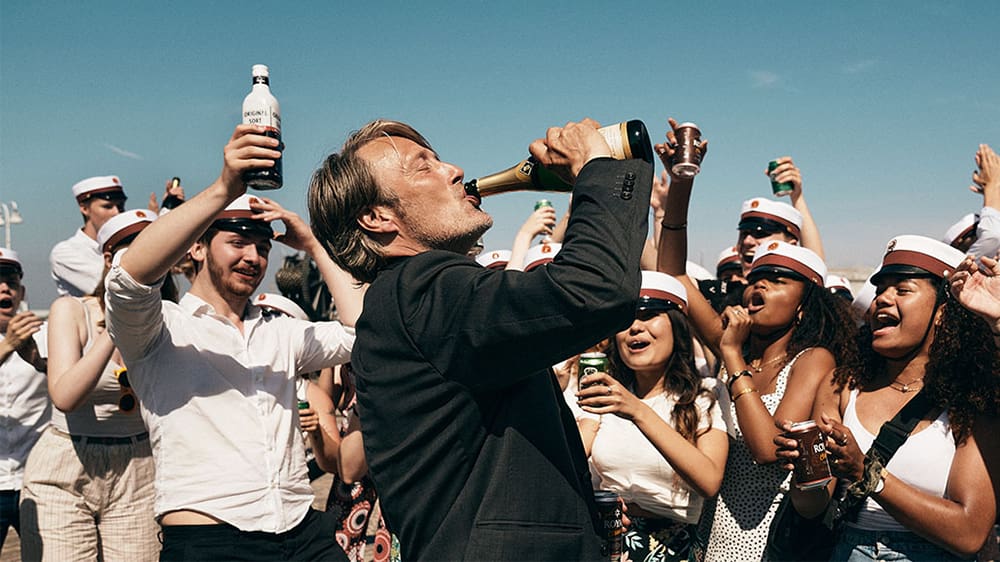Viewers familiar with Thomas Vinterberg’s The Hunt (2012) will have a very different experience with the Danish director’s latest outing. An alcohol-fuelled dark comedy, Another Round explores the consequences of four high school teachers and their experiments with alcohol during work hours. A simple plot that manages to unfold into tragic carnage, its protagonists are deconstructed by their efforts to dive deeper into their indulgence. Vinterberg has crafted a film that is incredibly funny, whilst remaining acutely aware of the complexities of human emotion. The punchlines are strong and the consequences hit hard. A coming of middle-age drama, Vinterberg uses alcohol as a vehicle to confront the internal anxieties born from our feelings of failure.
The film opens with a scene familiar to many Australians: a teenage drinking ritual. The Danish high schoolers race in a relay around a lake. Each team member must sink a beer at the different benches along the way, incentivised by the prospect of winning the proceeds from the recycled beer bottles. An incredibly catchy pop song blares over the festivities while the adults watch on in glee. Vinterberg doesn’t utilise the scene as a condemnation of youth drinking; instead, it represents a moment of joyous mischief, chaos and unity. It is this attitude of ambivalence that makes Another Round both a celebration of the revelry that can come from the consumption of alcohol, and a meditation on the importance of moderation.
This messaging is largely carried by the performance of the film’s lead, Mads Mikkelsen. Mikkelsen plays a high school history teacher, Martin. A husband and father of two, Martin has slipped into the monotony of middle age, going through the motions of the day, devoid of spark and charisma. This changes when he attends the birthday party of his friend and fellow staff member, Nikolaj. A psychologist, Nikolaj proposes an experiment where they see if a higher blood alcohol content will improve their quality of life. This experiment brings a new spark to their experiences.
The teacher’s experiment leads to an array of inebriated hijinks, filling the cinema with laughter for much of the first act. The teachers enthusiastically lead classes while drunk, coach childrens’ soccer matches and try to make their way undetected through staff meetings. This initial comedy escalates into absurdity, making the slowing down that comes afterwards more poignant, as the protagonists reap what they have sowed. As Vinterberg puts his characters through the extremes, he pauses to question if their initial newfound happiness is all placebo. The film is well paced but does take its time to transition into the third act. However, this isn’t a bad thing, as Vinterberg’s visuals and the dynamics he establishes between characters are a joy to watch.
An important way that Vinterberg’s comedy stands apart from its American counterparts is through its attention to the craft of cinema. Beautifully composed, Vinterberg’s DOP Sturla Brandth Grøvlen mimics the cerebral uncertainty induced by alcohol. The camera refuses to stay stable, even in the film’s most intense moments, with handheld shots and shallow depths of field leaving the audience with a feeling of uneasiness and uncertainty. While these cinematic choices effectively connect the craft of the film to its themes, it also harkens back to Vinterberg’s early career. A founder of the Dogme 95 movement with Lars Von Troyer, the young Danish filmmakers railed against the conventions of cinema. Dogme 95 restricted the filmmaking means of its followers through the signing of a vow of chastity. Directors were forbidden from the use of custom props, tripods and special effects, and instead had to ‘live in the moment’.
In 2002, David Bowie challenged Vinterberg on the sincerity of the movement, stating that it sounded like a satirical affair. Vinterberg responded that it was in fact a genuine heartfelt attempt to break the conservative mould of film. These naturalistic qualities of filmmaking are resonant throughout Another Round. Vinterberg paints the protagonists as creatures on a knife’s edge; teetering on the edge of primality within their urban environments.
Much of Another Round’s meditation on alcohol and the rollercoaster of life can be attributed to the personal tragedy faced by Vinterberg during the film’s early production, as Ida, Vinterberg’s 19 year old daughter, was tragically killed in a car accident. Vinterberg uses Another Round to preach a sermon about life, showing the audience the pleasures of risks and the pitfalls of excess. He invites audiences to realise that they need to take chances, experiment and explore because there is still time left. The film embraces the spectrum of effects of Danish drinking culture, weighing both the positives and negatives of alcoholic escapism. Another Round will continue to resonate as people return to a sense of normalcy following the pandemic, and have to come to terms with how to enjoy the world despite the anxieties and failures of the past.





